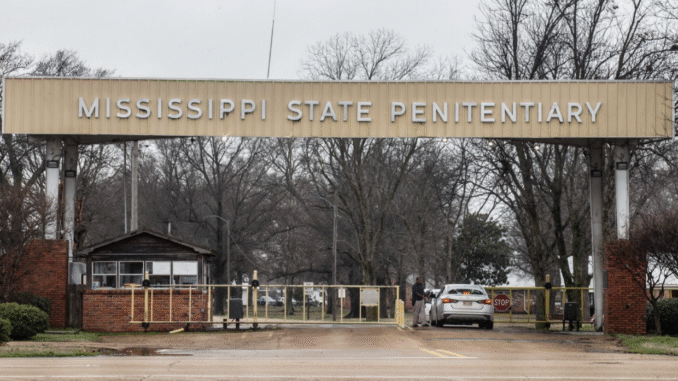
By Daja E. Henry, The Marshall Project
and Mina Corpuz, Mississippi Today,
This story is part of a reporting collaboration with Mississippi Today, the Clarion Ledger, Hattiesburg American and The Mississippi Link.
At least 42 people have been killed inside Mississippi prisons in the past decade, leaving scores of grieving families questioning a system that fails to protect people in its custody or hold anyone accountable.
There are sisters wracked with guilt, mothers with depression, and children struggling to fill the voids in their lives. Former prison employees talk about lying sleepless in bed, replaying the killings they’ve witnessed but could not stop.
In Mississippi, prison homicides are the culmination of long-documented festering problems: chronic understaffing, lax oversight, gangs that rule by violence and delays in treating life-threatening injuries, an investigation by a statewide reporting team found.
Murders signal “catastrophic failures” of prison administrators, whose number one job is to keep incarcerated people safe, said David Fathi, director of the ACLU National Prison Project.
The perpetrators haven’t faced justice in most cases. Just six of the 42 homicides have led to convictions.
And the killings show no sign of ending. In the first half of this year, there were five homicides in three Mississippi prisons.
Sydney Miller said her family was given almost no details by prison officials after her elder brother, Gregory Emary, was stabbed to death at the Chickasaw County Regional Facility in Houston in 2020.
Over the past five years, they have received no contact from prison investigators or prosecutors about what happened or if someone would be held responsible. Miller did not know Emary’s death had been deemed a homicide by a medical examiner until a reporter told her. She wonders if her family would have been treated the same way if her brother had been killed on the outside.
“So why is this any different?” Miller asked. “Just because it was committed inside prison walls?”
‘No one deserves to die like this’
Uncovering the toll of Mississippi’s prison homicides took a team of reporters from five news organizations: The Marshall Project – Jackson, Mississippi Today, the Clarion Ledger, Hattiesburg American and The Mississippi Link. The team scoured thousands of pages of court records, corrections documents, federal and state government death records, and interviewed families, formerly incarcerated people, former guards, attorneys and corrections experts.
The investigation found that the Mississippi State Penitentiary in Parchman, which holds about 2,500 people, has had the most killings in the past decade. At least 19 people died in homicides at Parchman from 2015 through 2024.
For most of this time period, the homicide rate among people inside Parchman was five times higher than the state as a whole, which already had the highest rate in the country in 2023.
Lack of consistent and accurate reporting nationwide makes a state-by-state comparison of prison homicides difficult. The reporting team identified three Mississippi homicides that were not listed in federal and state reports.
Most of the 42 killings throughout the state prison system involved beatings or stabbings, sometimes involving multiple assailants. Three in five victims were Black. The age of the victims ranged from 23 to 62.
Mississippi Department of Corrections officials declined multiple requests for an interview about killings across the prison system, but released an emailed statement. “MDOC remains committed to ensuring the safety of inmates in its custody,” the agency wrote.
Many of the people who were killed in Mississippi’s prisons were sent there after being convicted of offenses that included parole and probation violations, as well as more serious crimes, including robbery and murder. At least a quarter were serving life sentences. Although prison officials have a legal duty to protect all incarcerated people from harm, they could not protect them from death at the hands of cellmates, rival gang members or other incarcerated people.
In one case, a corrections officer pleaded guilty to accessory after the fact in a 2021 murder.
Detrick Munford, who served as deputy warden of Parchman until 2022, said the number of unprosecuted homicides doesn’t surprise him.
Mississippi officials didn’t install many of the cameras at Parchman until after 2020, so in many cases, there was no way to prove who was responsible for a death, he said. Anyone who witnessed a killing “is not going to talk,” he said, alluding to the prison culture of violent retribution, “because he knows what might happen to him.”
MDOC often shares sparse details about prison homicides, if any at all, even with the families of the victims. Nearly all internal investigations into the killings are hidden from the public because the state’s open records law exempts all law enforcement investigative files.
Although many of the recent homicides were filmed by security cameras and some of those responsible are known to corrections officials based on internal reports, local prosecutors filed charges against suspects in 36 percent of the homicides in the past decade.
MDOC officials responded in their email that prison officials take “every death of an inmate in its custody seriously. Each suspected homicide is investigated…The remaining investigations that are closed did not support a referral (for prosecution).”
For the incarcerated people who have been killed, their families are left with little, other than despair.
“This (is) an unimaginable pain you all gave me. This grief will last forever,” one victim’s mother wrote in a court statement for the upcoming trial of the prison murder of her son.
“People talk about justice. They say it’s blind. But justice shouldn’t be silent. It shouldn’t turn away when someone dies in state custody,” she wrote. “If the state takes responsibility for a person’s life, it should also be held accountable when that life is lost.”
Additional reporting contributed by Caleb Bedillion, The Marshall Project – Jackson, Grant McLaughlin, Clarion Ledger, Jerry Mitchell, Mississippi Today, and Christopher Young, The Mississippi Link.


Be the first to comment